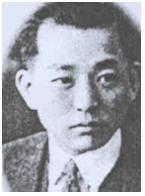Name: admin
2013-12-26 16:02:38 | Hit 2226
Files :  Lee Gil-yong.docx
Lee Gil-yong.docx
 Lee Gil-yong.docx
Lee Gil-yong.docx
Abductee: Lee Gil-yong
Recorded Date: January 12th, 2006
Profile of Abductee
Name: Lee Gil-yong (male)
Date of Birth: August 15, 1899(lunar calendar)
Place of Birth: Masan, Gyeongsangnam-do, South Korea
Last address: 56 Seongbuk-dong, Seongbuk-gu, Seoul, South Korea
Date of Abduction: Around July 17, 1950 (age 51)
Place of Abduction: At his home
Occupation: Dep. Organizing Director of Hanmin Political Party; Member of Temporary National Conference Preparing for Nation-Founding; Dep. Business Dept. Director, Dong-A Daily
Education/Career: Baejae High School/ Reporter of Dong-a Daily (Journalist)
Dependants: Wife, 5 sons and 1 daughter
Appearance/Personality: Short and thin, very righteous
Profile of Testifier
Name: Lee Tae-young (born in 1941)
Relationship: Son
Type of Witness: Indirect witness
Summary of Abduction
- First, he was taken immediately after the outbreak of the Korean War and released 3 days later.
- While keeping his house, he was taken again on the street near his house around July 17, 1950.
- Became known to the world when he, as a Dong-a Daily reporter, was imprisoned for the “Blacked-out Japanese Flag Incident” in 1936.
- A forerunner in the sports field, active in politics and nationalistic movement. He was abducted at around the same time as other journalists in group.
Detail of the Abduction
Q. What did he do when the Korean War broke out?
What made him known to the world was the Dong-a Daily’s “Blacked-out Japanese Flag Incident” when Korea was under the Japanese ruling. He removed the Japanese national emblem on the chest of the 1936 Olympic marathon champion Son Gi-jeong, in the photograph for the newspaper article. Besides, he was indirectly involved in the nationwide Independence Movement on March 1st 1919, before he became a journalist.
His role was transporting leaflets for the Interim Government, for which he was arrested and imprisoned for the first time, followed by five more various activities for independence of Korean Peninsula from Japanese ruling. He was reinstated by Dong-a Daily, after liberation of Korea and since then he was more active in journalism and nationalistic movements until he was abducted.
He was a forerunner in sports field; Standing Dir. of the Cho-sun Sports Association, Vice Chairman of the Baseball Association and founder of Korea Athletic Club. He was involved in several major athletic competitions and organizations, directly or indirectly. He was an influence in sports field. Before he was abducted, he was compiling “The History of the Korean Sports,” without completion.
Q. Has your father been awarded a medal?
The government policy in principle had been not to decorate any abductees on the ground that there were some abductees who cooperated with the North Korean regime and that it was not possible to know what they were doing in North Korea.
However, since the case of Mr. Cho Man-sik, it has given medals even to abductees, including my father, as the government was able to discover records that backed his involvement in the independence movement. An Order of Merit for National Foundation was awarded to him in 1991.
Q. Did he participate in political activities?
Actually, one of the main reasons for his abduction was his political activities. When the entire Korean society was in a turmoil after the liberation, it happened that many who fought for Korea’s independence had journalist background and many central figures of the Hanmin Political Party (Korea Democratic Party) were also former Dong-a men.
My father also served as a member of National Conference engaged in preparation of establishing the first Korean government together with other nationalistic leaders, and at the same time he was working to create Hanmin Political Party as its deputy organizing director.
During that time, there were confrontations between rightists and leftists, but those in the rightist group, Hanmin Political Party, were in the lead, which later involved itself in the Anti-Trust Movement. His political activities, in particular, is considered the main reason for his abduction.
Q. How was he abducted?
Many around me, including my father's friends and journalists, told me a lot about it. Most of them are no longer alive, but there was Mr. Lee Wan-gu, in particular, who lived in the same village with my father and they had been very close friends since their childhood. When the war broke out, my father was arrested and released after three days, first time. Mr. Lee advised my father to escape right away, as he thought things didn't seem normal.
My father, however, did not listen to him, thinking he had no reason to do so. He had done nothing wrong, nothing to be ashamed of and he didn’t leave his house. The agents of the North Korean Political Security Bureau, which had ready in hand a list of target people, abducted him on the street near his house on July 17, after they found material connected to his activities. No information, whatsoever, since then.
Reason behind the Abduction
Q. Why do you think he was abducted?
The North Korean regime already had an instruction to abduct South Koreans, with prepared lists of South Korean elite people, several hundreds of thousands, from which it selected final target persons needed not only for justifying its regime but also to use them for various purposes. Their plan was to bring them to North Korea, educate and brainwash them into cooperators to North Korea.
They often use the word "man of ability" even now. During that time, the North suffered from severe shortage of able men. Most able men were in and around Seoul while Pyeong-yang seriously lacked in competent leaders. This was why they abducted these able men to the North and tried to change them into their men.
Taking into consideration prevailing conditions, their plan was to abduct people group by group, including journalists, for whom education was to take place in Seoul. The fact that Mr. Lee Gwang-su (Chunwon by pen name, very famous writer), Mrs. Hwang Sin-deok, an educator, who also contributed to the Dong-a Daily, and others were also abducted almost at the same time tells that there had been a plan to group them together.
 
News after the Abduction
Q. Have you made any efforts for his whereabouts?
Yes, a lot. There was simply no way to know it immediately after the cease of the war. In the midst, there was one channel that we thought might give us a clue; arrested North Korean spies. There happened to be a North Korean espionage, Lee Su-geun, a former North Korean journalist. We tried to get some information from him but failed. Then, we tried some international organization agents who were travelling to Pyeong-yang as well as international organizations themselves, again to no avail.
Recently, we requested Minister Chung Dong-seong of Sports Ministry to look into this matter with an official letter, again to no avail. We have come to an assumption, on our own and with opinions of others around us put together, that there must have been some things wrong during the course of abduction.
Recorded Date: January 12th, 2006
Profile of Abductee
Name: Lee Gil-yong (male)
Date of Birth: August 15, 1899(lunar calendar)
Place of Birth: Masan, Gyeongsangnam-do, South Korea
Last address: 56 Seongbuk-dong, Seongbuk-gu, Seoul, South Korea
Date of Abduction: Around July 17, 1950 (age 51)
Place of Abduction: At his home
Occupation: Dep. Organizing Director of Hanmin Political Party; Member of Temporary National Conference Preparing for Nation-Founding; Dep. Business Dept. Director, Dong-A Daily
Education/Career: Baejae High School/ Reporter of Dong-a Daily (Journalist)
Dependants: Wife, 5 sons and 1 daughter
Appearance/Personality: Short and thin, very righteous
Profile of Testifier
Name: Lee Tae-young (born in 1941)
Relationship: Son
Type of Witness: Indirect witness
Summary of Abduction
- First, he was taken immediately after the outbreak of the Korean War and released 3 days later.
- While keeping his house, he was taken again on the street near his house around July 17, 1950.
- Became known to the world when he, as a Dong-a Daily reporter, was imprisoned for the “Blacked-out Japanese Flag Incident” in 1936.
- A forerunner in the sports field, active in politics and nationalistic movement. He was abducted at around the same time as other journalists in group.
Detail of the Abduction
Q. What did he do when the Korean War broke out?
What made him known to the world was the Dong-a Daily’s “Blacked-out Japanese Flag Incident” when Korea was under the Japanese ruling. He removed the Japanese national emblem on the chest of the 1936 Olympic marathon champion Son Gi-jeong, in the photograph for the newspaper article. Besides, he was indirectly involved in the nationwide Independence Movement on March 1st 1919, before he became a journalist.
His role was transporting leaflets for the Interim Government, for which he was arrested and imprisoned for the first time, followed by five more various activities for independence of Korean Peninsula from Japanese ruling. He was reinstated by Dong-a Daily, after liberation of Korea and since then he was more active in journalism and nationalistic movements until he was abducted.
He was a forerunner in sports field; Standing Dir. of the Cho-sun Sports Association, Vice Chairman of the Baseball Association and founder of Korea Athletic Club. He was involved in several major athletic competitions and organizations, directly or indirectly. He was an influence in sports field. Before he was abducted, he was compiling “The History of the Korean Sports,” without completion.
Q. Has your father been awarded a medal?
The government policy in principle had been not to decorate any abductees on the ground that there were some abductees who cooperated with the North Korean regime and that it was not possible to know what they were doing in North Korea.
However, since the case of Mr. Cho Man-sik, it has given medals even to abductees, including my father, as the government was able to discover records that backed his involvement in the independence movement. An Order of Merit for National Foundation was awarded to him in 1991.
Q. Did he participate in political activities?
Actually, one of the main reasons for his abduction was his political activities. When the entire Korean society was in a turmoil after the liberation, it happened that many who fought for Korea’s independence had journalist background and many central figures of the Hanmin Political Party (Korea Democratic Party) were also former Dong-a men.
My father also served as a member of National Conference engaged in preparation of establishing the first Korean government together with other nationalistic leaders, and at the same time he was working to create Hanmin Political Party as its deputy organizing director.
During that time, there were confrontations between rightists and leftists, but those in the rightist group, Hanmin Political Party, were in the lead, which later involved itself in the Anti-Trust Movement. His political activities, in particular, is considered the main reason for his abduction.
Q. How was he abducted?
Many around me, including my father's friends and journalists, told me a lot about it. Most of them are no longer alive, but there was Mr. Lee Wan-gu, in particular, who lived in the same village with my father and they had been very close friends since their childhood. When the war broke out, my father was arrested and released after three days, first time. Mr. Lee advised my father to escape right away, as he thought things didn't seem normal.
My father, however, did not listen to him, thinking he had no reason to do so. He had done nothing wrong, nothing to be ashamed of and he didn’t leave his house. The agents of the North Korean Political Security Bureau, which had ready in hand a list of target people, abducted him on the street near his house on July 17, after they found material connected to his activities. No information, whatsoever, since then.
Reason behind the Abduction
Q. Why do you think he was abducted?
The North Korean regime already had an instruction to abduct South Koreans, with prepared lists of South Korean elite people, several hundreds of thousands, from which it selected final target persons needed not only for justifying its regime but also to use them for various purposes. Their plan was to bring them to North Korea, educate and brainwash them into cooperators to North Korea.
They often use the word "man of ability" even now. During that time, the North suffered from severe shortage of able men. Most able men were in and around Seoul while Pyeong-yang seriously lacked in competent leaders. This was why they abducted these able men to the North and tried to change them into their men.
Taking into consideration prevailing conditions, their plan was to abduct people group by group, including journalists, for whom education was to take place in Seoul. The fact that Mr. Lee Gwang-su (Chunwon by pen name, very famous writer), Mrs. Hwang Sin-deok, an educator, who also contributed to the Dong-a Daily, and others were also abducted almost at the same time tells that there had been a plan to group them together.
 
News after the Abduction
Q. Have you made any efforts for his whereabouts?
Yes, a lot. There was simply no way to know it immediately after the cease of the war. In the midst, there was one channel that we thought might give us a clue; arrested North Korean spies. There happened to be a North Korean espionage, Lee Su-geun, a former North Korean journalist. We tried to get some information from him but failed. Then, we tried some international organization agents who were travelling to Pyeong-yang as well as international organizations themselves, again to no avail.
Recently, we requested Minister Chung Dong-seong of Sports Ministry to look into this matter with an official letter, again to no avail. We have come to an assumption, on our own and with opinions of others around us put together, that there must have been some things wrong during the course of abduction.
No |
Title |
Name |
Date |
Hit |
|---|---|---|---|---|
| 42 | Yun Tae-kyong |
admin |
13-12-26 | 2439 |
| 41 | Lee Ju-sin |
admin |
13-12-26 | 2038 |
| 40 | Son Hae-kyeong |
admin |
13-12-26 | 7051 |
| 39 | Seo Seung-kun |
admin |
13-12-26 | 2329 |
| 38 | Seo Byeong-ho |
adimn |
13-12-26 | 2544 |
| 37 | Park Sung-woo |
admin |
13-12-26 | 2087 |
| 36 | Park Hyon-Myong |
admin |
13-12-26 | 2276 |
| 35 | Lee Seong-hwan |
admin |
13-12-26 | 2520 |
| 34 | Lee In-hyeon |
admin |
13-12-26 | 2027 |
| 33 | Lee Hyung-ho |
admin |
13-12-26 | 17195 |
| 32 | Lee Gyu-chan |
admin |
13-12-26 | 5063 |
| 31 | Lee Gwang-soo |
admin |
13-12-26 | 2535 |
| 30 | Lee Gil-yong |
admin |
13-12-26 | 2225 |
| 29 | Lee Chae-deok |
admin |
13-12-26 | 16327 |
| 28 | Lee Bong-woo |
admin |
13-12-26 | 3364 |
| 27 | Kwon Tae-sul |
admin |
13-12-26 | 2620 |
| 26 | Kim Yu-yon |
admin |
13-12-26 | 2919 |
| 25 | Kim Ki-Jeong |
admin |
13-12-26 | 2555 |
| 24 | Kim Jae-bong |
admin |
13-12-26 | 2238 |
| 23 | Kim Gyeong-do |
admin |
13-12-26 | 2173 |






















 FAX : (82)31-930-6099
FAX : (82)31-930-6099
